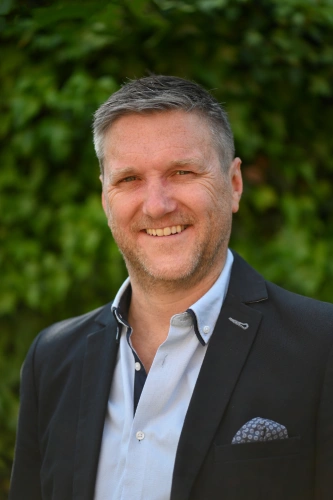The Phil Tindall Memorial Medal
Meet the inaugural winner of the Phil Tindall Memorial Medal
 What makes a good mentor? And how do you even become one in the first place? Richard Brooks, the inaugural winner of the Phil Tindall Memorial Medal for mentoring, shares his experience.
What makes a good mentor? And how do you even become one in the first place? Richard Brooks, the inaugural winner of the Phil Tindall Memorial Medal for mentoring, shares his experience.
Who are you and what do you do?
My name is Richard Brooks and I’ve been a civil engineer for 27 years and a mentor for almost 15 years.
I’m the Civil Structures National Service Lead at Waterman Group, a multidisciplinary consultancy which provides sustainable solutions to meet the planning, engineering design and project delivery needs of the property, infrastructure, environment and energy markets. I’m also a Fellow of the Institution of Civil Engineers.
As a student I was sponsored by Waterman, joining the firm when I graduated and I’ve been here ever since. It’s a varied career and I’ve been seconded elsewhere a few times, as well as progressing at Waterman, so there’s been no standing still. I started mentoring in 2010 and have been helping early years civil engineers develop their careers ever since.
How did you become a mentor?
It was quite a gentle start. I was seconded to a project as resident engineer with lots of junior staff on site, so I would help them to understand my decisions, advising them on what I was doing and why and providing the background to my chosen solutions.
It wasn’t a deliberate decision to mentor, more of a natural thing for me to ensure the rest of the team fully understood and supported what was being worked towards and how.
From there it gradually progressed into a more structured process as I officially became a mentor. Over the years I’ve had 12 mentees assigned to me, but there were many before that and if someone needs advice or support I’ll always see what I can do to help.
What does mentoring involve?
There’s no one size fits all, it’s different for every person, but there are some constants. For instance, I’ve supported many people who are working towards becoming chartered and that involves achieving a number of attributes.
I’ll begin with a simple conversation, getting to know the person: who they are, what they’re like, what inspires and motivates them, and what their aim might be. From there I can get an idea of what they might need to help them develop as an engineer. I’ll also make sure they know I’m always available – I’m here in the office and happy to have a chat. The start of any mentoring is about building the relationship so that the mentee feels comfortable about opening up to me. There’s no such thing as a stupid question, only a stupid assumption.
Then it’s about helping them to break down the big picture into its constituent elements. Much as we’d all like it to be, engineering isn’t all about massive bridges, so for instance when working towards getting chartered I help my mentees to understand the impact of their everyday engineering.
For example, carrying out a bridge survey is about more than just the survey. It’s about managing people, considering the safety of the team and any passers by, demonstrating an understanding of structures and materials, and so much more. This one activity can achieve numerous elements of a chartership application and I love seeing that lightbulb moment when the mentee begins to appreciate this.
Like a father with a child, I’m proud of seeing those moments of understanding and growth in my mentees. It’s important to me to give them responsibility and ownership of their work, so that they can develop and become more a part of the engineering fraternity. Seeing these moments happen also encourages me to work harder.
When I see another of my mentees get chartered I take a moment to sit and reflect and I think “wicked, another one’s on their way!”
How long do you work with your mentees?
How long is a piece of string? It varies, for graduate engineers I’ll usually supervise for two to three years; I currently have an apprentice who I’ve been working with for four years. Then we had a Japanese engineer come over for a visit so I supported them during their time with us – that was particularly interesting for me too because I got to see the similarities and differences in our approaches to the engineering.
Being a mentor doesn’t end though. Sure, some people move on, but I’ll still keep in touch and – just like the child that leaves home – I’m still here for them and keen to know how they’re doing and if they need any advice I’ll be here for a chat.
What advice would you give to someone who is considering being a mentor?
It’s a role that suits someone who is interested in people. Mentoring is not without its frustrations but the successes far outweigh what can sometimes be a difficult path – do it!
What does it mean to you to have won the Phil Tindall Memorial Medal?
It was a surprise! I don’t really go for awards, but I was encouraged to apply so I thought I’d give it a go. I had to ask a few people for testimonials to support my nomination and I was surprised at how quick everyone was to respond. The best thing about it was reflecting on the achievements of my mentees and acknowledging my own work.